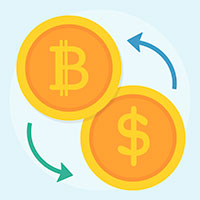All traders are different, but mistakes of psychological nature do not depend on gender or geographical factor. This allows us to highlight several of the most common problems and describe them in detail. The trading strategy assumes work exclusively by the rules. There is a checklist with a set of filters, and any market situation the trader evaluates according to this checklist. Only systematic trading gives a result on a long distance.
Among part of traders, non-systematic trading is widespread. It is placing and closing orders without any clear rules, it is impossible to understand the trader's style at least approximately by looking at placed positions.
Some of the trades are trending, there are attempts to trade against the market, and sometimes trader tries to scalp. The trader cannot get rid of fear and a feeling that they do something wrong. There is no confidence in own forces, and because of this trader wanders between different strategies, and tries to trade by other people's signals/analysis. This style is characterized by a large number of trades; it is impossible to put them on a unified basis. On a long distance, this approach does not work. The profit is possible only temporally and accidentally.
Desire To Be In The Market All The Time (Over-Trading)
This is one of the most widespread trader's psychological mistakes. The reasons are similar to the previous point - the trader does not have confidence in their abilities and knowledge, and cannot accept the fact that some of the movements will have to be skipped. The key to success is not to take profit in every movement but to be able to find the entry point with maximal profit probability. Some people do not understand this.
Every candlestick seems to such speculators as a missed profit, every hour out of the market - a lost opportunity to earn. The problem is that the entry points are not formed with such a frequency. Questionable methods of decision-making are used, and as the result, most of the trades turn out to be useless or losing.
Inability To Accept Losses
At first glance, this thesis seems strange. Everyone comes to the market to make money, it seems logical that there should be no losses. When we are talking about profit, we mean the result over a long distance. It is impossible to guarantee a profit on every trade. Losses are guaranteed; it is only necessary that the cumulative profit, for example, for a month exceeds the losses. When evaluating profitability, only the win rate and the size of the average Take Profit and Stop Loss are important.
Not accepting the losses undermines your faith in your own strength. Any strategy may have bad periods, and there may be a series of several losing trades in a row. These positions may be correct, i.e. open according to the checklist, but they are closed by a Stop Loss.
A trader with problems in the psychology of trading will start looking for problems in themselves. Instead of continuing to trade they may become nervous, revise the rules, and try to optimize the strategy.
Regular Shortfall Of Profit
A disciplined trader knows how to identify both entry and exit points. The second point is even more difficult, it is necessary to close the position in time - not to overstay in the market, but also not to exit it prematurely. Lack of discipline means an inability to control emotions. If the price goes in the right direction, the position is usually closed too early. For example, a position opened within a trend will be closed during the first correction. Although it would be more logical to wait for the reliable signs of market reversal and only then fix the profit. Corrections are suitable for topping up by trend.
Regular shortfalls in profits worsen the statistical indicators of the strategy and worsen such an indicator as the recovery factor. It means that it will be more and more difficult to come out of a drawdown in the future.
The art of trading involves the ability to wait. Most of the time a trader has to wait for some conditions to be met. The action itself (working with orders) takes only a couple of minutes.
Incorrect Use Of Stop Losses
This problem resonates with the inability to accept losses, the roots are common, but the manifestation of this type of error is different. Stops are used to limit losses, which means that even before opening a position the trader must estimate the allowable losses. If the stop level is calculated correctly, it will not move when the chart approaches the SL. The risk of the stop triggering grows, but it is normal - the trader knows that some of the trades are guaranteed to close with a loss. If SL triggers, the losses do not exceed the allowable limit and the trading just continues.
If the trader's psychology fails, then they are working with stops incorrectly:
- It is possible to completely ignore SL. Some strategies consciously refuse to use stops, but that is rare. More often than not, the absence of stops is a consequence of overconfidence. The trader does not believe in the theory that their forecasts might be wrong and the market will move in a losing direction.
- Greed and lack of confidence in one's own analysis can cause a trader to continually move the Stop Loss. The price is close to it, but it seems to the trader that if they move the SL by 20-30 points, there will be a chance to reverse the market. The order is moved the first time, the second, the third, and so on until the loss becomes unacceptable. The trader traps themself - now they are forced to fix the loss, several times exceeding the size of the initial stop.
As well as early profit taking, poor stop execution leads to a worsening of the recovery factor. As the loss grows, it will be more difficult to come out of the drawdown.
Desire To Recoup Instantly
One more consequence of the inability to accept losses and control emotions. The trader perceives losses as a challenge, almost as an insult. They feel hurt and want to get even instantly, exactly to get even, but not to trade with profit. At such moments, trading turns into an analog of gambling. There are methods of quick drawdown, such as Martingale. But this tactic is suitable only for experienced traders who have no problems with emotions.
Almost immediately after a triggered stop, the next trade is opened, then another one, and then another one. Sometimes a Martingale is added to this, which aggravates the situation. Applying this strategy, no market analysis is conducted, so it is more likely that the deposit will go into a deep drawdown.
Cumulative Losses
Constantly moving the stop is not the worst thing a trader can do. It is much worse when the trader builds a net of losing orders without a clear plan, shifting the breakeven point to their side. If a Martingale is used at the same time, the account will be drained with a probability of 99.999%. There are such trading tactics, but they are not recommended for emotionally unstable people.
Martingale makes the situation critical because, at each new level of the grid, the load on the deposit grows exponentially. It is enough to have 5-7 levels of the grid and the load on the account will become excessive.
Gambling Trading
Sometimes even non-systematic trading produces a series of profitable positions in a row. The market seems to be conquered, and the trader loses touch with reality and starts trading randomly. The main calculation is that one has managed to catch the tiger by the tail. It seems to be a trifle and in the next position, fortune will again turn its face. Market entries are made one after another, in the best case, the trader comes to consciousness when the deposit is in a deep drawdown. But more often the account is lost.
Lack Of Diversification
This refers more to life position in general. If a person sets a goal to make a career, for example, in the stock market and gets hung up on it, then in the future one risks getting a full-fledged depression and disappointment in life. Ambition itself is not a bad thing. But you should not bet on something as unstable as work in the financial markets.
At the initial stage, this direction should be additional. If with time income from work on the market becomes the main - that's great. If not, then there will be no catastrophe in life, you will have an ordinary profession.
Lack Of Personal Opinion
The actions of the crowd can carry a trader away in the same way, as the river carries away a person. Crowd psychology should not replace one's thoughts and plan of action. The crowd's actions should be considered, but they should not be the only basis for decision-making. The same applies to the opinion of famous analysts, and traders with experience. They are also wrong, if your analysis goes against their recommendations, it does not mean that they are right, and not you.
There's no need to play down the result of your market analysis. Learn from the very first days of trading to have your own opinion and not go with the flow.
Final Thoughts
Everyone wants to win as much as possible on every trade. Unfortunately, even the best traders place losing orders because of the factors mentioned in this article. However, willing to minimize the practices, habits, and emotions that lead to losing trades, you need to train your mind, body, and heart. Only by doing these things will you be able to reduce the likelihood of encountering losses while trading financial markets.
 For active traders and investors, mastering the art of trading volatility is a crucial skill. Volatility, in financial terms, refers to the extent to which asset prices fluctuate over time. High volatility markets experience rapid price swings...
For active traders and investors, mastering the art of trading volatility is a crucial skill. Volatility, in financial terms, refers to the extent to which asset prices fluctuate over time. High volatility markets experience rapid price swings... The global financial market operates as a dynamic ecosystem, where understanding the connections between different market movements can provide invaluable insights for forecasting...
The global financial market operates as a dynamic ecosystem, where understanding the connections between different market movements can provide invaluable insights for forecasting... The forex market, also known as the foreign exchange market, stands as the largest and most traded financial market globally. FXTM is committed to equipping our clients...
The forex market, also known as the foreign exchange market, stands as the largest and most traded financial market globally. FXTM is committed to equipping our clients... Cryptocurrency trading has rapidly grown into a bustling and dynamic market that attracts traders from around the world. With the potential for significant profits...
Cryptocurrency trading has rapidly grown into a bustling and dynamic market that attracts traders from around the world. With the potential for significant profits... The year 2023 has been a landmark period for the international broker Octa (formerly known as OctaFX), characterized by significant achievements and substantial contributions...
The year 2023 has been a landmark period for the international broker Octa (formerly known as OctaFX), characterized by significant achievements and substantial contributions...